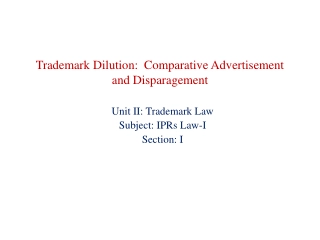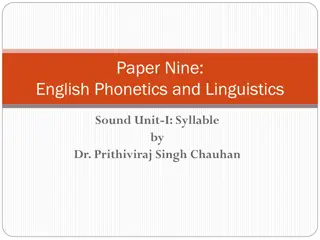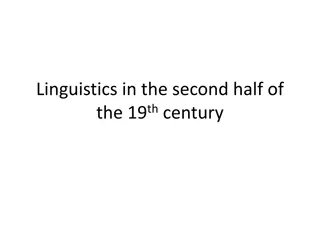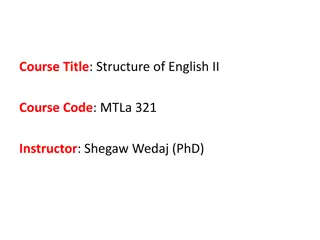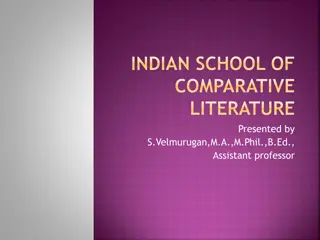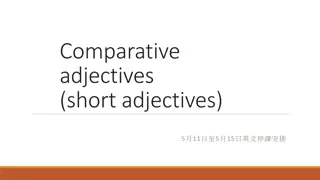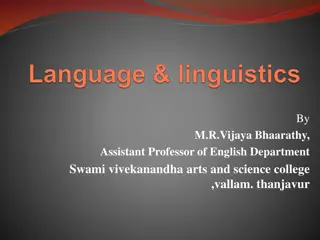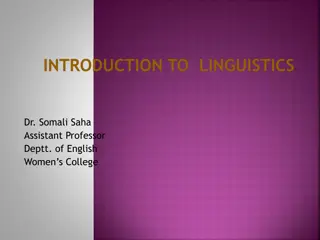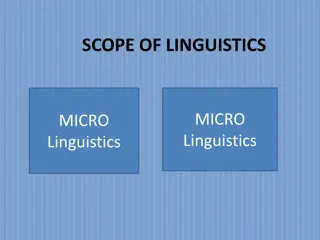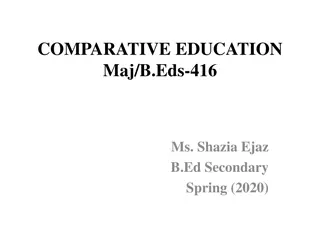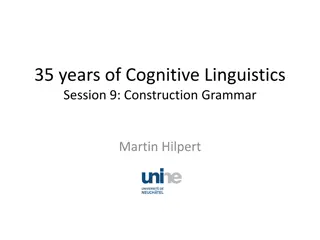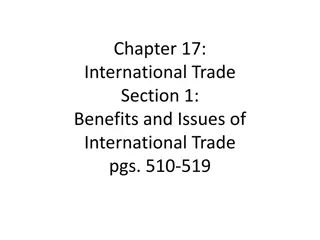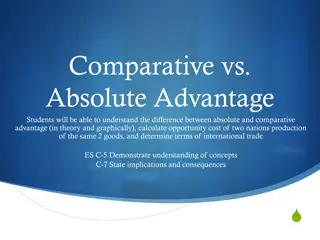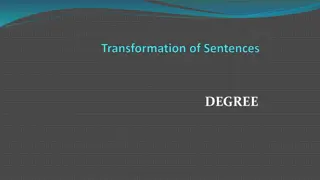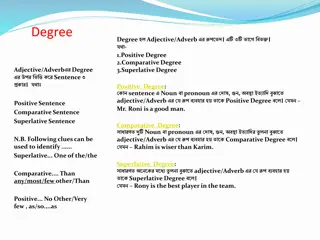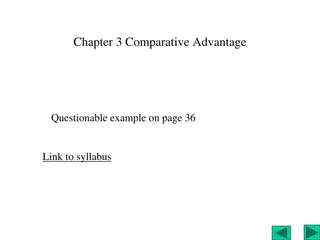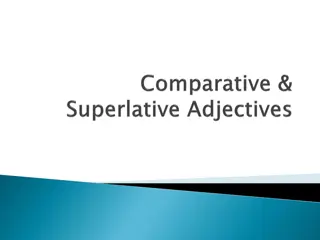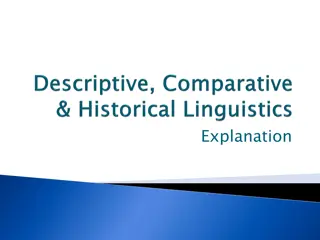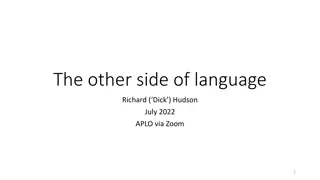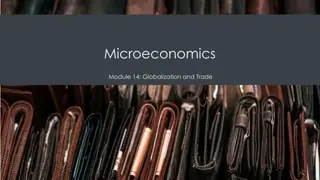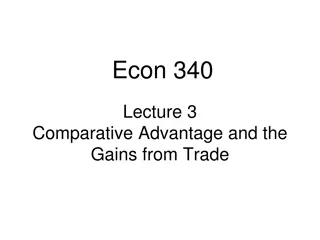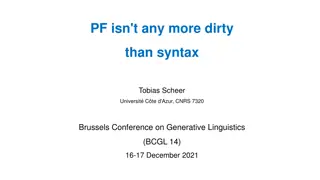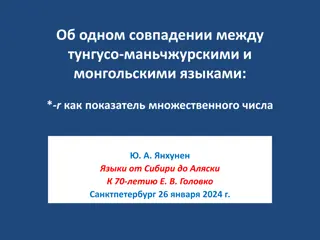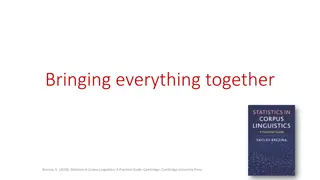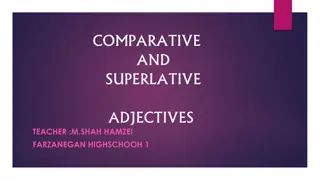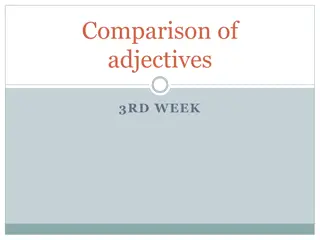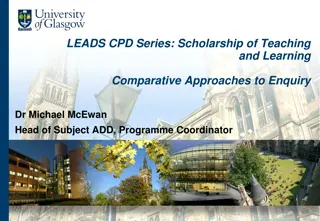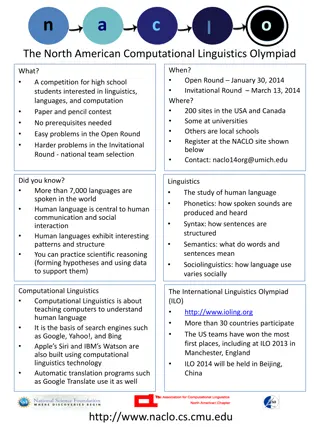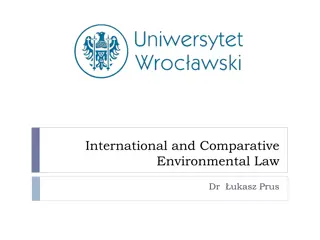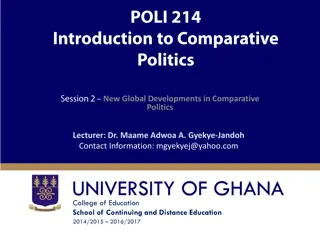Trademark Dilution and Comparative Advertisement
Trademark dilution and comparative advertisement in trademark law. Understand the grounds for trademark infringement and the elements needed to establish dilution or disparagement. Explore the importance of protecting registered trademarks and the limitations of comparative advertisement.
0 views • 6 slides
Comparative Analysis of Positive Charge's Charging Stations Evolution
This PowerPoint template example created by Romy Bailey for Positive Charge showcases a comparative study of high-speed charging stations versus traditional charging stations, along with a comparison of past year versus current year data, and a year-over-year analysis of Positive Charge's growth. It
1 views • 6 slides
Understanding English Syllables: Phonetics and Linguistics Insights
Explore the concept of syllables in English phonetics and linguistics, learning about syllable formation, examples of mono and disyllabic words, and the role of vowels and consonants in syllable structure. Delve into the essence of syllables as individual sound units within words. Discover more thro
10 views • 8 slides
Comparative Sociology
Comparative Sociology is a specialized branch that compares societies to provide generalizations, focusing on the structure and jurisdiction of groups and organizations. It involves studying affinities and disparities to predict outcomes. The discipline is closely related to Social Anthropology. Com
3 views • 15 slides
Linguistics in the Second Half of the 19th Century: Schleicher, Psycholinguistics, Neogrammarian Theories
August Schleicher's biological approach to language, including his Stammbaumtheorie, aligned with Darwinian ideas prevalent in the 19th century. The origins of psycholinguistics can be traced back to Heymann Steinthal, who advanced the psychology of language. This period saw critical developments in
4 views • 22 slides
An Exploration of Stylistics in Linguistics: Expressive Means and Stylistic Devices 2. Stylistics as a branch of linguistics examines expressive means and stylistic devices which enhance the emotive and aesthetic qualities of language. These include
Stylistics, Linguistics, Expressive Means, Stylistic Devices, Language
5 views • 25 slides
Understanding Structural Linguistics: An Exploration of Language and Signs
Delve into the intricate world of structural linguistics through an in-depth analysis of language components, linguistic signs, and the relationship between language and linguistics. Explore the concepts of syntagmatic vs. paradigmatic relations, linguistic signs as associations of sound and meaning
4 views • 62 slides
Insights into the Indian School of Comparative Literature: A Comprehensive Overview
The Indian School of Comparative Literature, pioneered by Dr. Buddhadeva Bose in 1956 at Jadavpur University, plays a crucial role in studying the diverse languages and rich literary traditions of India. This academic discipline has grown significantly, with a focus on French symbolist poetry's infl
2 views • 14 slides
Comparative Adjectives: Short Adjectives and Usage
Comparative adjectives are used to compare two things, such as the length, size, or appearance. They can be formed by adding -er to short adjectives like big, long, thin, short, and pretty. When the adjectives end in -y, change the -y to -i and add -er. Use "than" to compare two things in the same s
5 views • 10 slides
Understanding Linguistics: An Overview of Language Study
Linguistics is the scientific study of human language systems, encompassing phonetics, syntax, semantics, phonology, pragmatics, and morphology. It explores how language functions, aids in language teaching, and facilitates error analysis. The scope of linguistics includes investigating sound system
1 views • 21 slides
Understanding Linguistics: Overview, Branches, and Scopes
Linguistics explores the study of language, encompassing its nature, structure, and functions. It delves into the characteristics of human language, definitions, branches such as applied linguistics and psycholinguistics, as well as scopes like microlinguistics and macrolinguistics. The field invest
1 views • 11 slides
Overview of Micro and Macro Linguistics
Micro linguistics focuses on the scientific study of speech sounds, word formation, syntax, and meaning within a language, while macro linguistics delves into the societal, psychological, and neurological aspects of language use. Micro linguistic areas include phonetics, phonology, morphology, synta
1 views • 7 slides
Understanding Comparative Education: Scope and Aims
Comparative education involves studying educational theories and practices across different countries to analyze the relationship between education and society. It aims to explain educational systems, aid in the development of institutions, and form generalized statements applicable in various natio
0 views • 31 slides
Exploring Construction Grammar in Cognitive Linguistics Symposium
Delve into the realm of Construction Grammar with Martin Hilpert in the 35th year of Cognitive Linguistics. Discover the intricacies of idiomatic constructions, the distinction between constructions and constructs, coercion in neologisms, and more. Explore the relationship between Construction Gramm
1 views • 81 slides
Understanding Applied Linguistics: Definitions, Rationale, and Purpose
Delve into the realm of applied linguistics through a comprehensive outline featuring historical perspectives, defining moments, and the overarching purpose of this field. Explore how applied linguistics tackles language-related social issues and addresses challenges in education and communication.
0 views • 12 slides
Understanding International Trade: Benefits, Specialization, and Comparative Advantage
International trade involves benefits and issues, with specialization playing a key role in driving economic patterns through resource distribution. David Ricardo's theory of comparative advantage revolutionized trade by focusing on producing goods efficiently. Absolute advantage and comparative adv
0 views • 12 slides
The Importance of International Trade: Benefits and Comparative Advantage
Nations engage in trade to exchange goods and services across borders, benefiting from comparative advantage to produce efficiently. Comparative advantage theory highlights the efficiency gains when each nation focuses on what it does best. Importing and exporting goods and services allow countries
0 views • 10 slides
Understanding Comparative and Absolute Advantage in International Trade
Understand the concepts of absolute and comparative advantage through theory, graphical illustrations, and opportunity cost calculations for two nations. Explore the implications and consequences of these concepts in terms of international trade. Specialization, division of tasks, and gains from tra
0 views • 15 slides
Examples of Superlative and Comparative Forms
The content includes examples of superlative and comparative forms, along with positive constructions. Images are used to illustrate each example, making it easy to understand the concepts. Different scenarios are presented to demonstrate the usage of superlative and comparative adjectives in senten
0 views • 42 slides
Understanding Degrees of Adjectives and Adverbs
This content explains the concept of positive, comparative, and superlative degrees of adjectives and adverbs in English grammar. It provides rules and examples for transforming positive into superlative, positive into comparative, comparative into positive, comparative into superlative, and more.
0 views • 8 slides
Understanding Comparative Advantage in Economics: Adam Smith and David Ricardo
Explore the concepts of absolute advantage versus comparative advantage as discussed by renowned economists Adam Smith and David Ricardo. Discover how free market principles, self-interest, and efficient resource allocation shape beneficial economic decisions. Delve into examples of comparative adva
0 views • 13 slides
Comparative and Superlative Adjectives Usage Guide
Discover how to form and use comparative and superlative adjectives to compare two or more nouns. Learn the rules for adding -er or -est endings, using "more" or "most," and irregular adjectives like "good" and "bad." Follow step-by-step formulas to create sentences with comparative and superlative
0 views • 11 slides
Evolution of Linguistics: From Philosophy to Descriptive Study
Linguistics has evolved significantly from being a branch of philosophy to a distinct field called Descriptive Linguistics. It now focuses on studying language in itself rather than in relation to other disciplines, aiming to describe and analyze the structure and operation of languages at different
0 views • 20 slides
Comparative and Superlative in Pennsylvania Dutch 101
Covering the formation of comparative and superlative forms in Pennsylvania Dutch (PD), the content explains how PD adjectives add endings and change stem vowels to express comparison. It discusses irregular adjectives and provides examples to practice forming comparative forms in PD phrases.
0 views • 11 slides
Understanding Halliday's Systemic Functional Linguistics
Exploring the concepts of Systemic Functional Linguistics as introduced by Halliday, this text delves into the role of language in everyday interactions, cultural studies, and literary theories. It highlights the different functions of language - interpersonal, ideational, and textual - and their ap
0 views • 25 slides
Exploring Linguistics and the Linguistics Olympiad
Dive into the world of linguistics with retired Professor Dick Hudson as he shares his journey of discovery and passion for language. Explore the challenges and joys of the Linguistics Olympiad, bridging the gap between the hard and soft sides of language. Discover the intricate connections in langu
0 views • 41 slides
Comparative Law: Research, Analysis, and Resources
Explore the world of comparative law through research and study of legal systems, including Italian and foreign laws. Delve into comparative legal analysis, characteristics of legal systems, and the study of legal sources. Discover in-depth insights from a variety of books and academic journals, as
0 views • 36 slides
Understanding Globalization, Trade, and Comparative Advantage in Economics
Globalization and trade play a crucial role in the interconnected world economy. This module explores the gains from international trade, barriers to trade, costs of globalization, and the concepts of absolute and comparative advantage. Absolute advantage is when a country can produce a good using f
0 views • 27 slides
Understanding Comparative Advantage and Gains from Trade
In this lecture on comparative advantage and gains from trade, the concept of why countries trade, price differences, supply and demand, the Ricardian model of trade, identifying comparative advantage, and critiques of comparative advantage are discussed. The benefits of free trade and how it leads
0 views • 53 slides
Exploring Minimalism in Linguistics: Dirty PF and Clean Syntax
This text delves into the relationship between syntax and PF (Phonological Form) in the context of minimalism theory in linguistics. It discusses how minimalism aims to achieve clean syntax by discarding imperfect elements, with PF often considered as "dirty" due to its association with phonology. T
0 views • 40 slides
Comparative Study on Mongolic and Tungusic Languages
Explore the fascinating linguistics of Mongolic and Tungusic languages, delving into their historical sources, internal reconstruction, morphology, syntax, and class markers. Discover the parallels and differences between these language families, analyzing aspects such as sound systems, lexicon, and
0 views • 16 slides
Practical Guide to Statistics in Corpus Linguistics
This content provides insights on statistical thinking principles in corpus linguistics, emphasizing attention to detail, data quality, effect size calculation, visualization, and the interplay between statistics and linguistics. It also touches on key learnings, clarifications, and directions based
0 views • 20 slides
Exploring Modern Trends in Linguistics
Cognitive linguistics, functional grammar, text linguistics, and communicative linguistics are shaping the field of linguistics in the 21st century. These trends delve into the cognitive aspects of language, emphasizing language's role in organizing and conveying information. Cognitive linguistics h
0 views • 37 slides
Understanding Comparative and Superlative Adjectives: M. Shah Hamzei Farzanegan High School
Learn how comparative and superlative adjectives are used to compare objects in English language. Find out the rules to form the comparative and superlative forms of adjectives based on the number of syllables, spelling changes, and exceptions. Improve your English language skills with practical exa
0 views • 13 slides
Comparative and Superlative Forms of Adjectives in Latin Grammar
Exploring the declension patterns and irregular forms of comparative and superlative adjectives in Latin, including examples and comparisons with paradigms of different declensions. Learn about the nuances in the declining of 3rd declension adjectives and their comparative forms, along with exercise
0 views • 14 slides
Comparative Approaches in Educational Enquiry: A Scholar's Perspective
This session delves into the world of comparative research in education, exploring different settings and methodologies. Dr. Michael McEwan shares insights on Glassick's Framework for design and the importance of appropriate methods. Discover the essence of comparative research, including ex post fa
0 views • 18 slides
North American Computational Linguistics Olympiad: A Competition for High School Students
The North American Computational Linguistics Olympiad (NACLO) is a competition for high school students interested in linguistics, languages, and computation. It consists of an Open Round in January and an Invitational Round in March, with no prerequisites needed. Participants tackle easy problems i
0 views • 4 slides
Unlocking the Power of Phraseology in Linguistics Research
CPA, led by Patrick Hanks, delves into collocation analysis and meaning interpretation in linguistics. By examining phraseological patterns, the institute aims to build a comprehensive inventory for various verb senses, highlighting the significance of normative and exploitative linguistic uses. The
0 views • 9 slides
Comparative and International Environmental Law Course Overview
Explore the world of Comparative and International Environmental Law with Dr. ukasz Prus through in-depth examinations, take-home exams, and insightful discussions on topics such as environmental policy, law sources, and regional systems. Dive into the complexities of waste management, common legal
0 views • 102 slides
New Global Developments in Comparative Politics Since the 1980s
The lecture by Dr. Maame Adwoa A. Gyekye-Jandoh explores new global developments in Comparative Politics since the 1980s, covering topics like rapid industrialization in Asia and the collapse of communism in the Soviet Union and Eastern Europe. Students are introduced to key concepts such as the Com
0 views • 20 slides
